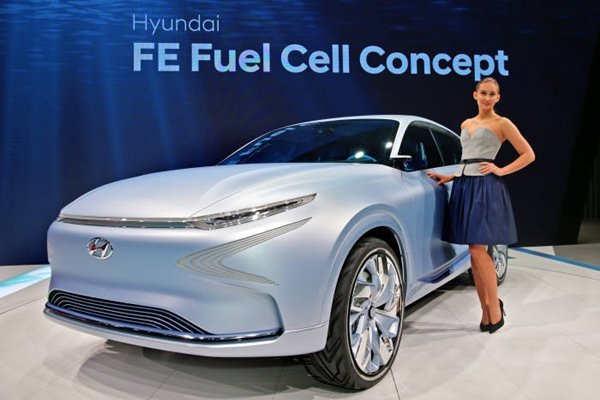Hyundai Motor Company has secured major technologies for hydrogen fuel cell electric vehicles as it is able to produce its own hydrogen fuel cell electric vehicles and develop and produce its own hydrogen fuel cells. With its technologies, it is expecting that it will be able to greatly reduce hydrogen fuel cell electric vehicle’s price, which is considered as the biggest disadvantage of hydrogen fuel cell electric vehicle.
Although release of its platform for hydrogen fuel cell electric vehicle is later than release of Toyota’s platform, its technologies are more advanced than the level of technologies announced by Toyota. It is expecting that it will be able to grab upper hands in global markets for hydrogen fuel cell electric vehicles in the future and enhance its competitive edge in such markets.
According to industries on the 10th, Hyundai Motor Company completed development of its own MEA (Membrane Electrolyte Assembly), which has the highest level of technical difficulty out of 3 major hydrogen fuel cell technologies (MEA, separator, GDL (Gas Diffusion Layer) for hydrogen fuel cell electric vehicle, and metallic separator. It is going to establish production lines for MEA and metallic separator at its factory in Chungju sometime next month and start mass-producing major components for hydrogen fuel cells.
By securing these major technologies, Hyundai Motor Company is expecting that it will be able to reduce production cost of hydrogen fuel cell electric vehicles by at least 30%. Price of a hydrogen fuel cell takes up about half of price of a hydrogen fuel cell electric vehicle. MEA and separator take up about 70% of price of a hydrogen fuel cell. It is likely that while Hyundai Motor Company will be able to greatly increase its competitive edge through acquisition of components and reduction of production time, it will be able to increase safety and efficiency in drive to a world class level by making hydrogen fuel cell electric vehicles lighter.
It is likely that Hyundai Motor Company will apply these technologies to ‘FE hydrogen fuel cell electric vehicle ‘, which was first introduced last March at Geneva Motor Show and is expected to be released next year. It is expected that price of this car will be lower than Toyota’s hydrogen fuel cell electric vehicle called Mirai ($57,500), which was released in 2014.

“By developing major technologies of hydrogen fuel cell electric vehicle with our own technologies and materials, we will be able to push forward a generation of hydrogen fuel cell cars.” said a representative for Hyundai Motor Company. “Although it is difficult to simply compare our fuel cell electric vehicle to Mira, we believe that our technologies are more advanced than technologies introduced by Toyota.”
MEA is an important component that contributes in electricity generation such as output of fuel cell. Until now MEA markets were dominated by GORE from the U.S. and Johnson Matthey from Germany. Separator maintains high thermal conduction of fuel cell and prevents variety of fuel materials from getting mixed. Although Hyundai Motor Company used thick separator in the past by cutting graphite, it has reduced thickness of separator under 0.1mm by developing its own metallic separator. By simplifying number of processes, it can reduce production tie and cost. It is also advantageous for making cars lighter as volume has been greatly reduced and as mass-production has been made possible.
Hyundai Motor Company started hiring 300 additional South Korean and foreign fuel cell developers and employees, who have either Masters or Ph.D. degrees, at its laboratory in Mabuk as it prepares for full-scale mass-production system. If 200 engineers for hydrogen fuel cell electric vehicle are added to this number, Hyundai Motor Company has pretty much secured at least 500 professionals just for its hydrogen fuel cell electric vehicle business.
“Internalization of MEA and metallic separator is not for production and price but it is to have competitive edge in mass-production of optimized fuel cells.” said a representative for Hyundai Motor Company. “Not only will it resolve high financial burden of hydrogen fuel cell electric vehicle but it can greatly increase level of completion of safety and performance.”
Although Hyundai Motor Company released world’s first fuel cell car called ‘Tucson ix’ in 2013, it lost its upper hand in related markets when Toyota released Mirai in 2014. Until end of last month, 1,770, 1,810, and 130 Mirais were sold in Japan, U.S., and Europe respectively. On the other hand, only about 700 Tucson ixs were sold so far.
“As Hyundai Motor Company succeeded in internalizing MEA and separator, it has created a two-way competition in markets for hydrogen fuel cars with Toyota.” said Professor Park Cheol-wan who is an expert in electric vehicle. “It should release fuel cell electric vehicle as soon as possible so that its car can be verified from markets.”
Staff Reporter Park, Taejoon | gaius@etnews.com